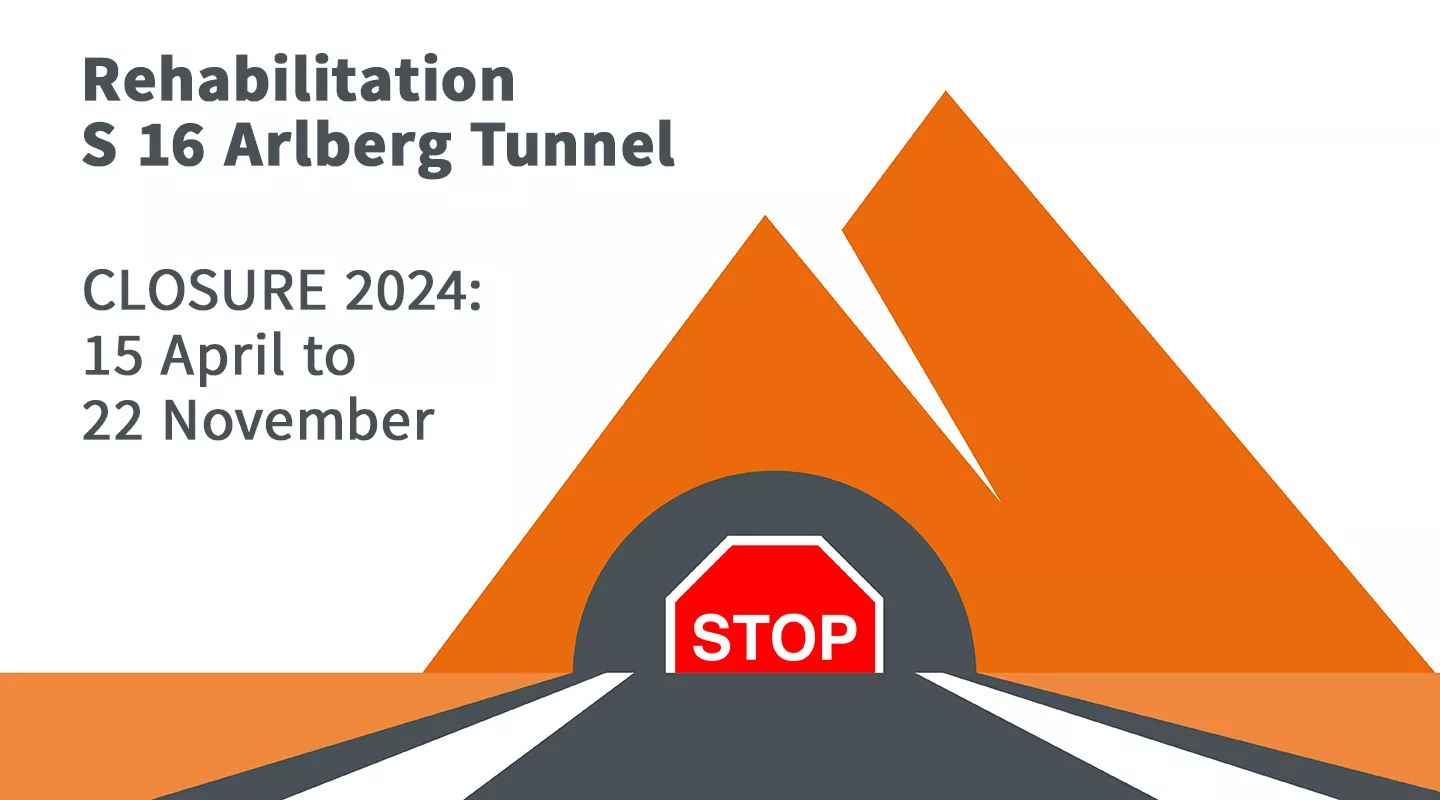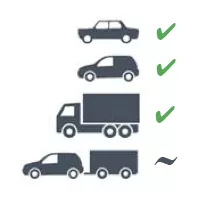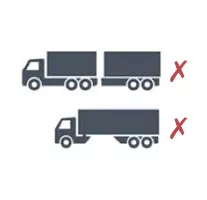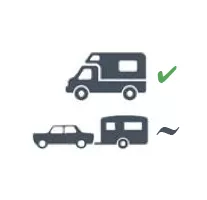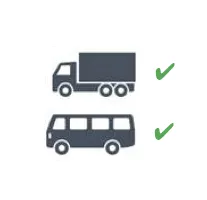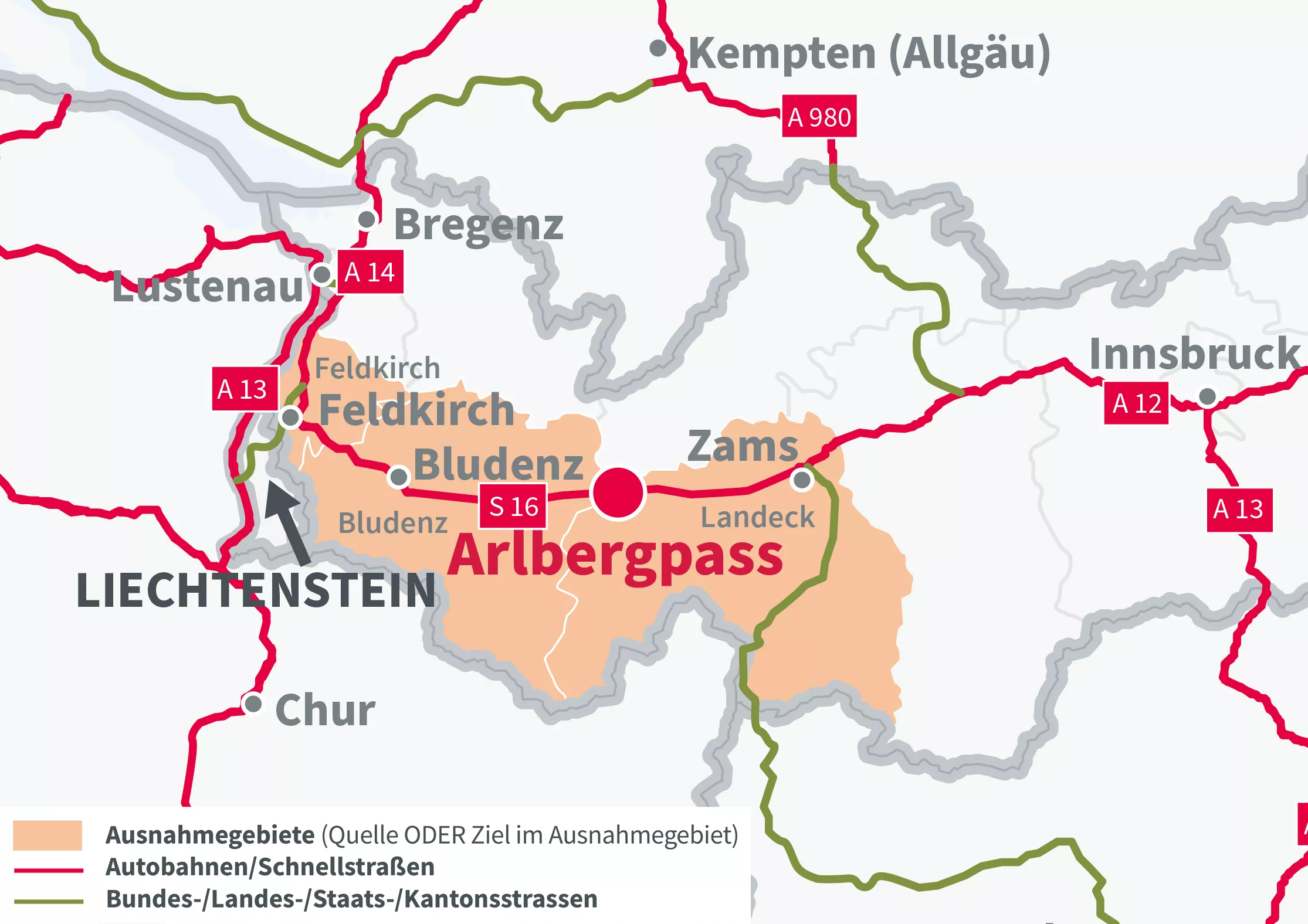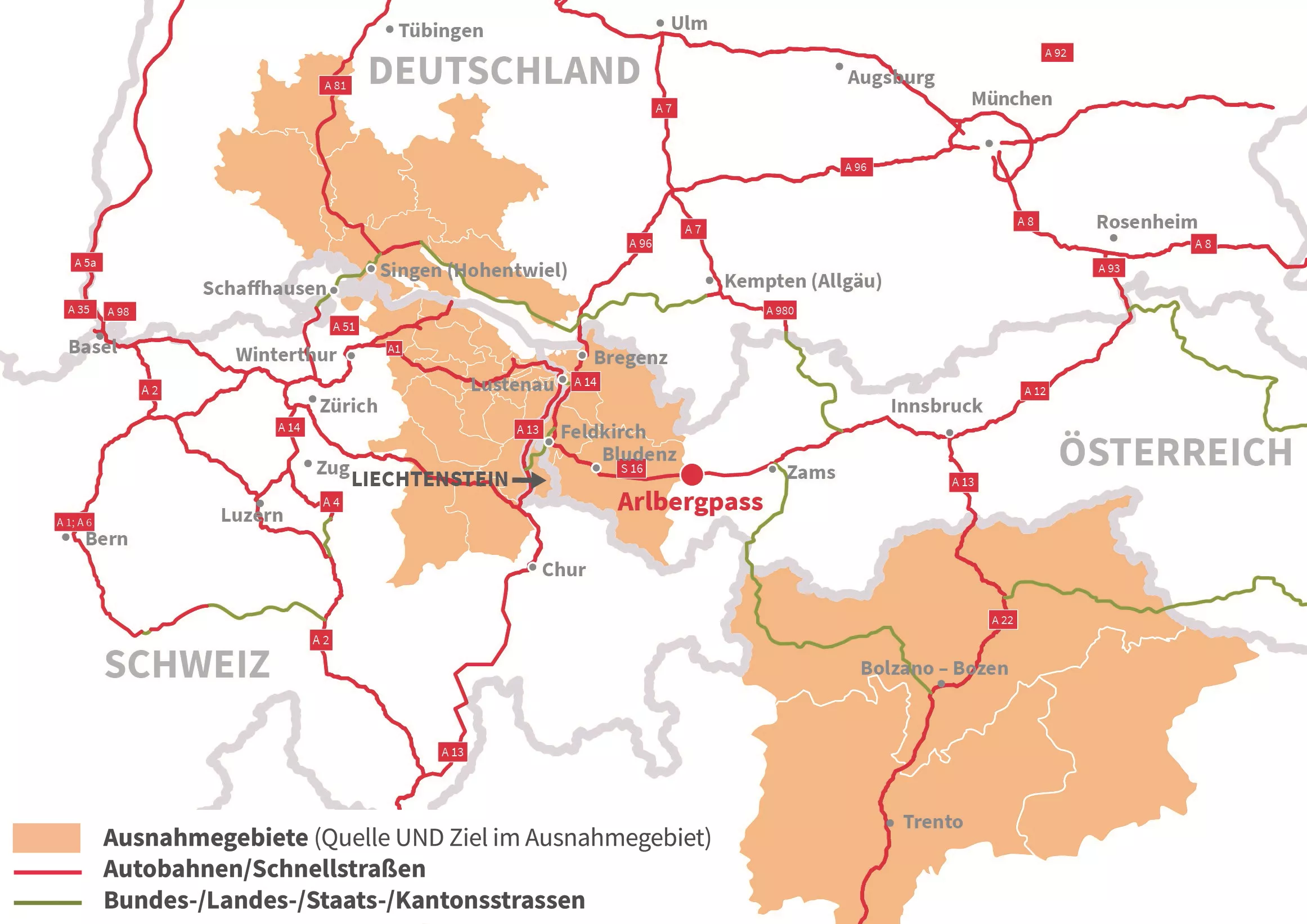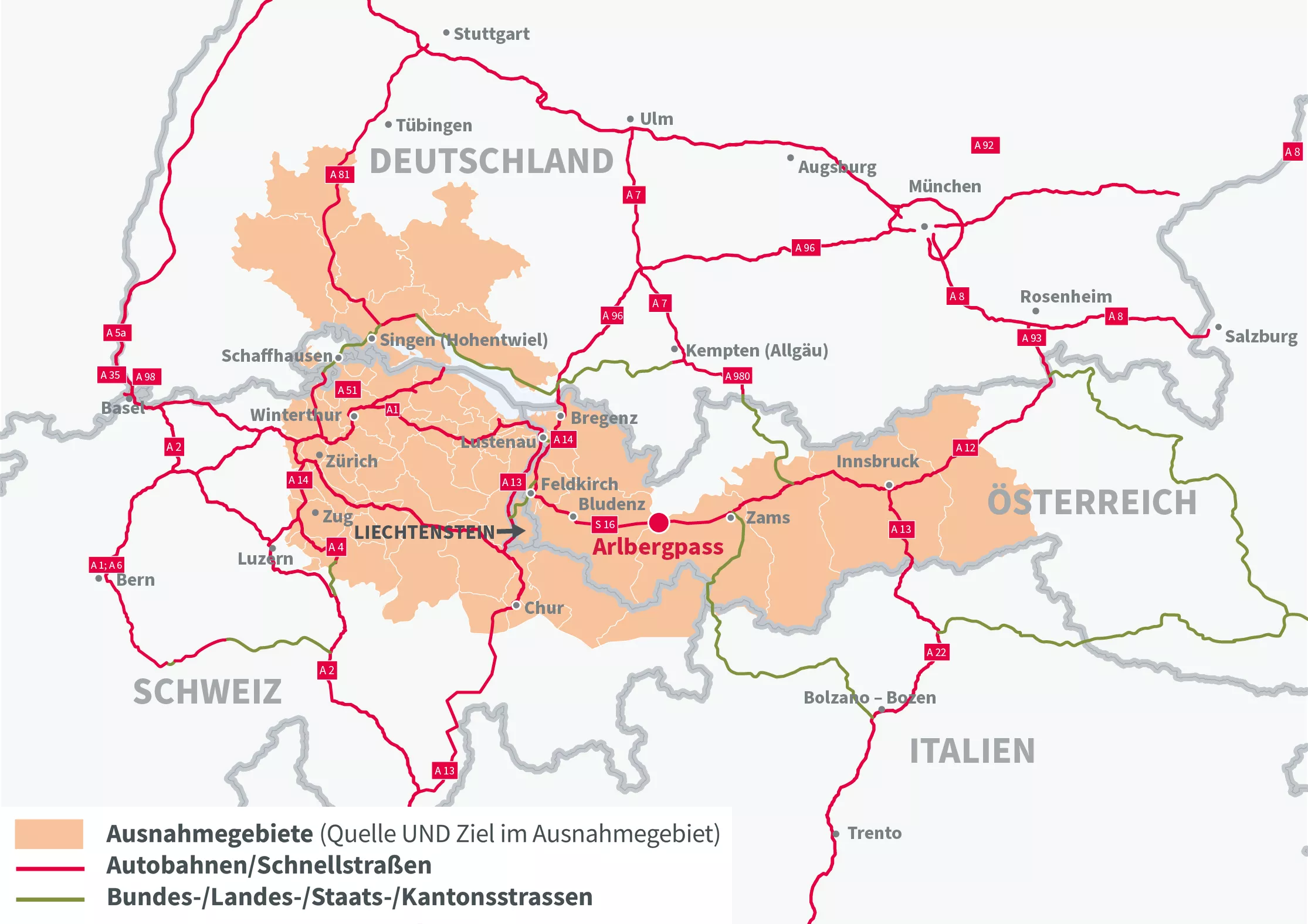Rehabilitation and closure of Arlberg Tunnel
Info
We are at work for you. Your benefits at a glance.
- Arlberg Tunnel’s overall length 14 kilometers
- Scheduled costs of second phase of tunnel rehabilitation 75 million Euros
- Scheduled costs of the modernisation of the toll station 30 million Euros
- Scheduled closures 15 April to 22 November 2024
- Improved road safety
Renewal of road surface along the entire tunnel and optimised tunnel lining for improved visibility - Sustainable rehabilitation measures
Optimised drainages systems for continued long-term tunnel use - Modern toll station
New toll lanes, cabins and additional lorry parking with accessible toilets
Important facts at a glance
At 14 kilometres, the Arlberg Tunnel between St. Anton in Tyrol and Langen in Vorarlberg is more than just the longest single-tube road tunnel in Austria. In Austria's high-ranking road network, the tunnel marks the only east-west connection between Tyrol and Vorarlberg that isn't affected by winter weather. After 45 years of use, we will now renew its road surface, drainage system and tunnel lining.
These measures will make Austria’s longest road tunnel safer for some 8,000 road users that use it every day.
During this period, it is not possible to traverse this tunnel safely. This is why the tunnel's full closures from 15 April to 22 November 2024 cannot be avoided.
According to the current state of coordination, the following regulations apply for the closure in 2024:
- Regulation sheet of the district Landeck (in German only) 25.04.2023 (.pdf, 167.0 KB)
- Regulation sheet of the district Bludenz (in German only) 25.04.2023 (.pdf, 112.8 KB)
The Arlberg Pass will serve as the regional diversion during the full closure. Due to traffic overload, delays are possible on this pass during the weekends. This is why we recommend: Give yourself enough time if you decide to travel during the closures and (if possible) use public transport or one of the long-distance diversions. The latter run through Rosenheim-Munich (Germany), Gotthard and San Bernardino (Switzerland).
All cars, estate cars and lorries without trailer as well as cars and estate cars with trailers (including caravans) are free to use this route as long as the trailer does not exceed 750 kilograms (maximum permissible weight). Between 1.7. and 6.10.2024 on Saturdays, Sundays and public holidays between 9 am and 5 pm cars and estate cars with trailers exceeding 750 kilograms (maximum permissible weight) must use the long-distance diversions via Germany, Fern Pass or Switzerland.
ASFINAG recommends allowing for more time when using the Arlberg Pass. Especially on the weekends, delays are possible along the B 197/L 197 Arlberg Pass Road due to traffic overload.
Lorries with trailers and articulated vehicles are generally prohibited from using the B 197 / L 197 Arlberg Pass Road for the duration of the full closure of the Arlberg Tunnel (15.04. to 22.11.2024). Such vehicles must use the long-distance diversions (see diversions). A clearly defined destination and originating traffic also allows lorries with trailers and articulated vehicles to drive on the Arlberg Pass, provided that the journeys comply with the relevant exemptions (see exemptions). A separate exemption permit for these journeys is not required. On weekends (Saturday, 9.00 am to Sunday, 10.00 pm) lorries with trailers as well as articulated vehicles are generally prohibited from using this route.
There are no restrictions for motorcycles during the entire period of full closure. The Arlberg Pass can be used by motorcyclists at any time.
However, ASFINAG advises to allow more time for the journey over the Arlberg Pass. Especially on the weekends, delays are possible along the B 197/L 197 Arlberg Pass Road due to traffic overload.
All cars, estate cars, motorhomes and lorries without trailer as well as cars and estate cars with trailers (including caravans) are free to use this route as long as the trailer does not exceed 750 kilograms (maximum permissible weight). Between 1.7. and 6.10.2024 on Saturdays, Sundays and public holidays between 9 am and 5 pm cars with trailers exceeding 750 kilograms (maximum permissible weight) must use the long-distance diversions via Germany, Fern Pass or Switzerland.
ASFINAG recommends allowing for more time when using the Arlberg Pass. Especially on the weekends, delays are possible along the B 197/L 197 Arlberg Pass Road due to traffic overload.
For lorries not pulling a trailer as well as buses with and without trailers there are no restrictions for using the Arlberg Pass.
ASFINAG recommends allowing for more time when using the Arlberg Pass. Especially on the weekends, delays are possible along the B 197/L 197 Arlberg Pass Road due to traffic overload.
According to exemptions, lorries with trailers and articulated vehicles may use the Arlberg Pass if their journeys meet the exemption requirements. These exemptions will be in place between Sunday 10:00 pm and Saturday 9:00 am as follows:
Local destination and originating traffic
Info
North-west-south-east traffic
Lorries with trailers and articulated vehicles may use the Pass if their journeys originate and reach their final destination in Vorarlberg, in Liechtenstein, in the districts of Bodensee, Constance, Sigmaringen, Tuttlingen, Schwarzwald-Baar or Rottweil, in the Cantons of St. Gallen, Thurgau, Appenzell Innerrhoden, Appenzell Ausserrhoden or Glarus and the provinces of Bolzano, Trento or Belluno. This exemption applies to north-west-south-east traffic.
Info
West-east traffic
Lorries with trailers and articulated vehicles may use the Pass if their journeys originate and reach their final destination in Vorarlberg, in Liechtenstein, in the districts of Bodensee, Constance, Sigmaringen, Tuttlingen, Schwarzwald-Baar or Rottweil, in the Cantons of St. Gallen, Thurgau, Appenzell Innerrhoden, Appenzell Ausserrhoden, Glarus, Schwyz, Zug, Zurich or Schaffhausen and the following municipalities/towns in the Canton Grisons (north of the Chur – Davos line): Ardez, Calfreisen, Castiel, Chur, Conters i. P., Davos, Fanas, Felsberg, Fläsch, Fideris, Flims, Ftan, Furna, Grüsch, Guarda, Haldenstein, Igis, Jenaz, Jenins, Klosters-Serneus, Küblis, Laax, Langwies, Lavin, Lüen, Luzein, Maienfeld, Maladers, Malans, Mastrils, Pagig, Peist, Ramosch, Saas i. P., Samnaun, Says, Schiers, Scuol, Seewis i. P., Sent, St. Antönien, St. Antönien-Ascharina, St. Peter, Susch, Tamins, Tarasp, Trimmis, Trin, Tschlin, Untervaz, Valzeina oder Zizers AND in the Tyrolean municipalities of Landeck, Imst, Innsbruck - Stadt, Innsbruck - Land or Schwaz. This applies to west-east traffic.
Info
Due to the closure of the S 16 Arlberg Tunnel, road traffic will be diverted via the Arlberg Pass Road from 15.04. to 22.11.2024. Due to the expected additional traffic volume during the peak travel season, cycling is again banned on the B 197/L 197 between Langen station or St. Anton (Mooserkreuz) to the pass summit in St. Christoph. This ban applies only to cyclists going uphill in the period from 15.04. to 22.11.2024.
This means that St. Christoph am Arlberg can no longer be reached uphill by bicycle. This ban also applies to cyclists coming from Lech-Warth over the Flexen Pass in the direction of Tyrol. During this time, a shuttle service will be set up from St. Anton and Langen for cyclists.
For cyclists, a shuttle service will be set up from St. Anton and Langen during this time.
The validity of annual toll passes for the S 16 Arlberg expressway is automatically extended by the period of the closure if the card's area of validity covers the period of one of the two full closures. This ensures that customers do not suffer any disadvantage when purchasing an annual toll pass due to the full closures.
Conserving resources is of paramount importance to us, even on a construction site of this dimension. For the 23,500 cubic meter concrete road surface, we therefore rely on recycling. Some 60 percent of the old road surface are reused and installed on site after the material has been processed in a mixing plant. Because no landfill areas are required and most of the recycling takes place on site, waste and truck journeys are significantly reduced. Wood is increasingly used as a building material for the structural engineering in the area of the toll plaza. This also applies to the pedestrian bridge for customers at the toll plaza.
Why is a closure of the tunnel necessary at all?
The rehabilitation of the Arlberg Tunnel, which has been in operation for 45 years, also includes the complete renewal of the road surface, drainage system and tunnel lining. Without these facilities, safe travel through the tunnel or work safety cannot be guaranteed. For this reason, we have done everything we can to make these necessary closures as short as possible, as was the case most recently in 2015/2017 and 2023 now in 2024. In particular, for reasons of occupational safety and the partial lack of safety technology in the course of implementing the necessary measures, no traffic can pass through the tunnel during the activities.
May I take my car across the Arlberg Pass?
During the full closure, cars may use the Arlberg Pass Road (B 197/L 197) without restriction. There are only restrictions that apply to cars with trailers exceeding 750 kilograms (maximum permissible weight). Between 1.7. and 6.10.2024 on Saturdays, Sundays and public holidays between 9 am and 5 pm these must use the long-distance diversions via Germany, Fern Pass or Switzerland.
May I take my motorhome across the Arlberg Pass in summer?
Motorhomes without a trailer can use the Pass at any time without restriction. On the other hand, caravans with trailers exceeding 750 kilograms (maximum permissible weight) have to divert via Germany, Fern Pass or Switzerland on Saturdays, Sundays and public holidays between 9 am and 5 pm from July 1 to October 6, 2024.
Will my arrival for the winter vacation 2024 affected by the closure?
No – we also take the needs of the Arlberg tourist area into consideration during the second full closure. For this reason, the closure will not begin until mid-April – i.e. after the end of the main winter season 2024. This ensures that the current winter season is not affected in terms of arrival and departure.
Will my journey to the summer vacation in the tourist region Arlberg (St. Anton, St. Christoph, Lech Zürs, Stuben) 2024 affected by the closure?
No – travel to the destinations in the Arlberg tourist region is possible at any time, as the Arlberg Pass route is unrestricted in both directions (from the direction of Vorarlberg and from the direction of Tyrol). The closure of the Arlberg tunnel therefore has no effect in terms of closure or accessibility of these regions.
What do I have to keep in mind when travelling on the Arlberg Pass Road during the closure?
Especially on weekends, a higher traffic volume is to be expected on this stretch. This can lead to delays. We therefore advise you to allow more time when driving over the Pass. Basically, the Arlberg Pass Road has a gradient of up to 13 percent – this should also be taken into account when driving. Our safety tip: Adjust your speed and leave a sufficient safety distance.
Why doesn't ASFINAG build a second tube at the Arlberg Tunnel?
We are a purely user-financed company and do not receive any subsidies from the state budget apart from the revenue from vignettes, truck and route tolls. The Arlberg Tunnel is currently used by some 8,000 vehicles every day. Even in the forecast, this stretch does not reach the value of 20,000 vehicles per day on average (sum of both directional lanes). Only above this frequency is the construction of a second tube mandatory under the Road Tunnel Safety Act. Irrespective of this, we are investing around 75 million Euros to improve safety for 8,000 motorists every day.
Do I have to play toll for the Arlberg Pass as a regional alternative route?
No. The Arlberg Pass is neither a motorway nor an expressway and can be used without additional tolls.
